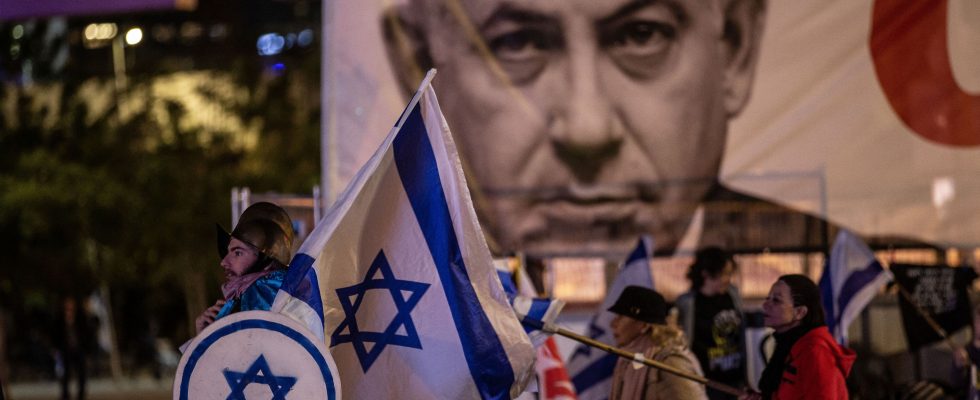In June 2021, the Knesset returns after several weeks of interruption and long negotiations to form a government. In the middle of Parliament, Benyamin Netanyahu seems lost, until a colleague gives him a pat on the back to show him his place: downstairs, on a simple seat, like any “vulgar” deputy. For the first time in twelve years, the man nicknamed “Bibi” by his fans is no longer Prime Minister but leader of the opposition.
For a year and a half, Netanyahu sports, depresses and rambles on the “alliance of traitors” in power, which brings together his former right-hand men. “Each day away from his throne was a crossing of the desert for him”, confides a regular in Israeli politics.
His alliance with Jewish supremacists, a pact with the devil
So, Bibi plans his return to power. In the spring of 2021, the riots of Israeli Arabs in the “mixed” cities of the Jewish state arouse fear throughout an entire country. A feeling that Netanyahu will use wonderfully to sow discord in the government, break it up and then come out on top in the legislative elections. Power-hungry, prosecuted in court for corruption, he decides to break a taboo in the history of Israel and joins forces with Jewish supremacists, supporters of a “Greater Israel” without Palestinians, to form a government last December . “This coalition was not his first choice, but it was the only one, poses Hugh Lovatt, an analyst at the European Council on Foreign Relations. His political career, but also his personal life, was at stake. ally with these actors, even though, as a politician of such stature, he knew very well the obstacles and the challenges that this coalition would cause.”
Netanyahu entrusts major ministries to the hardest extreme right, in particular to Itamar Ben Gvir and Bezalel Smotrich, the spearheads of the settlers. Since the beginning of the year, the West Bank has been on fire: Israeli forces have been carrying out daily raids against Palestinian militants, killing several people with each intervention, with attacks in retaliation. “The Palestinians do not allow themselves to be stopped and prefer to die as martyrs, underlines Kobi Michael, researcher at the Institute for National Security Studies in Tel Aviv. Each martyr becomes a hero for the Palestinians and the infernal dynamic continues… We have lost the control over events.
The call of an Israeli minister to “raze” a Palestinian village
The most radical ministers no longer hide their desire for a conflagration, in order to settle the “Palestinian question” once and for all, and in their own way. Any incident serves to throw oil on a fire already out of control. Like March 1, when Finance Minister Smotrich, who defines himself as a “homophobic fascist”, shares his wish to see the army “raze” the Palestinian village of Huwara, after the murder of two Israelis. Three days earlier, hundreds of settlers had carried out an avenging raid against its inhabitants.
Added to the chaos in the West Bank is that of the Israeli streets: for two months, hundreds of thousands of demonstrators have been marching every week against the judicial reform initiated by Netanyahu, which aims to bring the Supreme Court, the main guarantor of Israeli democracy, into line. There too, the Prime Minister must come to terms with his most extreme allies… The Minister of Justice, Yariv Levin, is accelerating the reform and refusing any compromise, even though the Prime Minister is asking for more flexibility. “Netanyahu can position himself as the moderate force in the government, notes Hugh Lovatt. Admittedly, his political party loses points, his own image suffers, but he can put an end to this coalition if he wishes and remains, in the eyes of the public. “part of public opinion, the only one capable of being Prime Minister. He has always known how to take advantage of political chaos.”
In this regard, Bibi is likely to be served in the coming weeks, with the start of Ramadan at the end of March and Passover (Jewish Passover) at the beginning of April. In recent years, religious holidays have often been synonymous with an increase in communal violence, and the scent of a third Intifada hangs in the air. At the same time, recent days have seen a large influx of American ministers and soldiers arrive in Jerusalem, while tensions with Iran are at their highest. The shadow war with Tehran risks coming into full light every day…
Such a scenario, considered very seriously in the corridors of Israeli politics, would allow Netanyahu to declare a state of emergency and form a government of national unity, with more traditional allies. A way, too, to stay in power a little longer.
